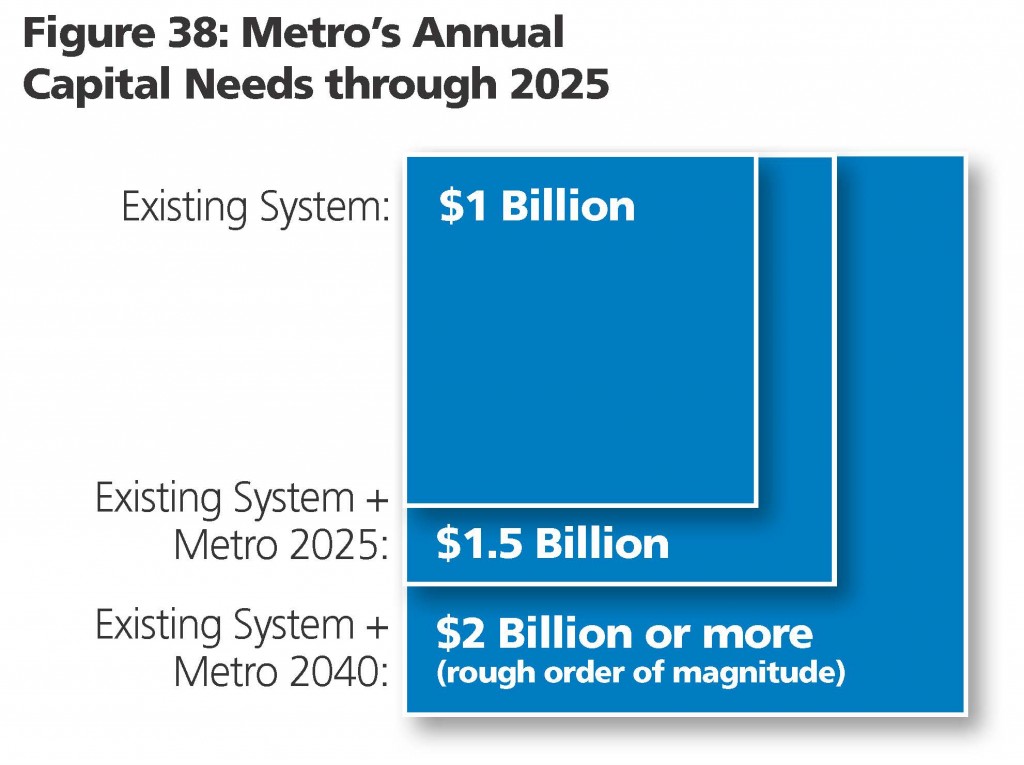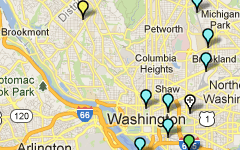Addressing the Funding Challenge
Like many of the nation’s transit  agencies, Metro must rebuild its once-new capital assets as they wear down and deteriorate after decades of use. Metro could feasibly use every penny in its capital budget for years to come just reducing its backlog of maintenance issues. Moreover, Metro also needs to ensure that the system is able to overcome the capacity constraints that come with a regional population expected to swell in both the central core and the suburbs in the years ahead. And on top of this, Metro will need to address calls for entirely new service in many areas of the region. Once Metro is rehabilitated, the system will require a stable level of investment to maintain a state of good repair as it continues to age and deteriorate. Metro estimates that $1 billion (in 2012 dollars) per year is necessary to support and maintain the existing system, even after rehabilitation. Metro 2025 will expand the core and system capacity, as well as ensure that the region’s capital investments are successful. This requires an additional $500 million, on average, in annual capital funding through 2025.
agencies, Metro must rebuild its once-new capital assets as they wear down and deteriorate after decades of use. Metro could feasibly use every penny in its capital budget for years to come just reducing its backlog of maintenance issues. Moreover, Metro also needs to ensure that the system is able to overcome the capacity constraints that come with a regional population expected to swell in both the central core and the suburbs in the years ahead. And on top of this, Metro will need to address calls for entirely new service in many areas of the region. Once Metro is rehabilitated, the system will require a stable level of investment to maintain a state of good repair as it continues to age and deteriorate. Metro estimates that $1 billion (in 2012 dollars) per year is necessary to support and maintain the existing system, even after rehabilitation. Metro 2025 will expand the core and system capacity, as well as ensure that the region’s capital investments are successful. This requires an additional $500 million, on average, in annual capital funding through 2025.
Certainly, increases in the overall size and scope of the system will also have an impact on operating costs, which would grow to some degree when new rail cars, buses, and service are put in place. These operating costs may grow in line with the proportional size of system expansion or at a lower rate, especially if increases in reliability and the increased attractiveness of transit to today’s non-riders has a disproportionate effect on ridership, mode choice, and revenues for modes that have high farebox recovery ratios today and/or where existing demand is already delivering more revenue than operating costs.
Metro recognizes that the region must plan now for regional mobility needs in a post-2025 world. That is why Metro’s leaders are already hard at work on the long-term Regional Transit System Plan, which recommends the transit network the region will need by the year 2040.
This proposed network supports continued economic growth and prosperity as well as shapes economic development opportunities region-wide, ensuring the long-term competitiveness of the region’s economy and investment climate. It also ensures that the region has the world-class transit network that will anchor an enhanced quality of life, increased regional mobility, connectivity, and productivity, and the fostering of a region that grows sustainably.
Metro’s Capital Funding Agreement continues through FY2016 and provides a solid foundation for supporting a state of good repair for the existing system. To achieve the capacity improvements identified for Metro 2025 and beyond, Metro must sustain the current level of investment and seek commitments from regional partners to fund the needed capacity improvements.
Metro will work with the regional Congressional delegation to seek a re-authorization of the $1.5 billion federal funding provided to Metro under the Passenger Rail Investment and Improvement Act of 2008 (PRIIA). Reauthorization of Moving Ahead for Progress in the 21st Century (MAP-21) the current federal surface transportation legislation and funding mechanism, will also be critical to maintaining the baseline funding of Metro’s current capital program.
The majority of the additional $500 million in annual funding needed to implement Momentum will require a renewed commitment to the regional partnership that allowed the National Capital Area to build, and rebuild the Metro system. As Metro’s regional funding partners directly benefit from the return on investment that Metro conveys, they may also have the most compelling reasons to re-invest in the system. To the greatest extent possible, Metro will also leverage other federal funding programs, such as those provided in the Transportation Infrastructure Finance and Innovation Act (TIFIA), in an effort to lower borrowing costs and accelerate delivery of critical projects.
For more information:
Download both the full Momentum plan and the Executive Summary.
Regional support is important to making Momentum a reality! A number of regional stakeholders have already endorsed Momentum. Please sign on and add your name to endorse Momentum and send the message that public transit is vital to the National Capital Region.


Recent Comments